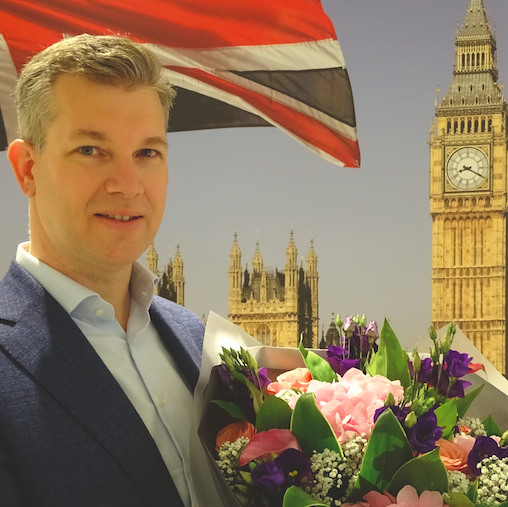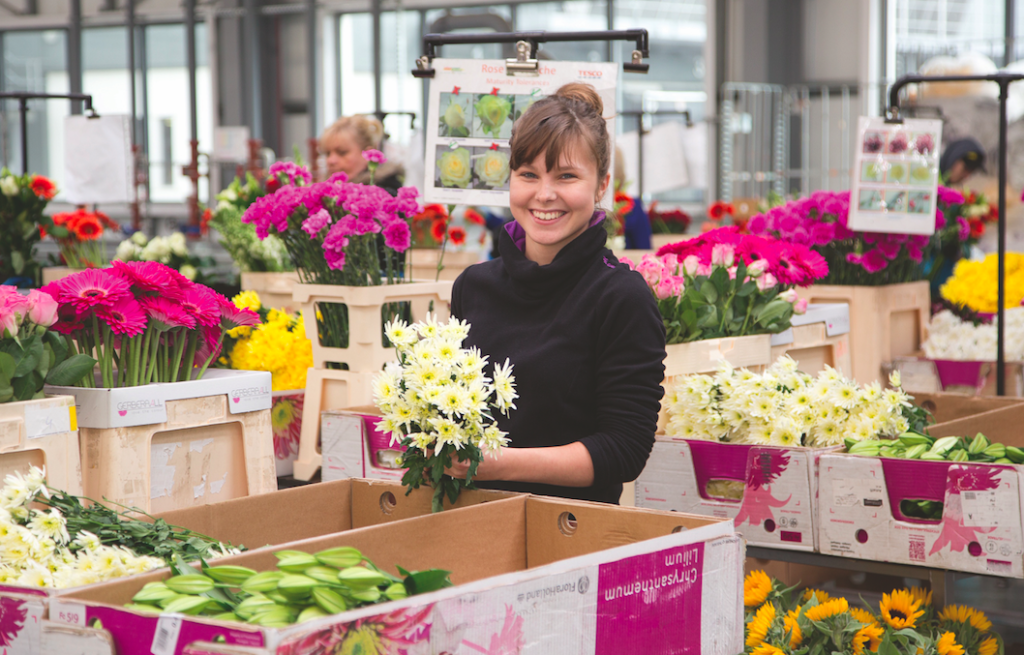Since the announcement of Brexit, the value of the British pound has gone down dramatically. Without reducing the number of plants or flowers they sell, Intergreen suddenly receives 15% less in their bank account. And for British consumers, it means that plants and flowers have become more expensive. Niels van der Plas calls it the new reality. “If we want to keep our market position, we must take action now.”
By Cindy van der Zwet
Niels van der Plas has been working with Dutch Flower Group since 2009 and he has been Managing Director at Intergreen since 2012. He’s leading the company together with colleagues Jan Paul Rijke and Arnold Kloostra. When Brexit was announced two years ago, his background in finance came in handy. “Brexit doesn’t keep me up at night, but it’s definitely keeping us busy at the moment”, he starts the conversation.

Intergreen depends on the United Kingdom in several ways. Firstly, because it’s an important distribution market for the company, even if they are increasingly active in Central Europe, Ireland and America too. Secondly, because they’ve got a production location in England. That’s where all their bouquets for English retailers are made.
The production costs used to be lower in the UK than in the Netherlands, but the last couple of years, the labour costs have been going up. “We’ve been facing mandatory salary increases as a result of government measures; the national minimum wage went up. We’re talking about at least 5% per year. To keep overall costs down, we’re investing in mechanisation and robotization”, explains Van der Plas.
Another problem is the pressure on the job market. The decline of the pound means that foreign workers’ salaries (converted into euros) have gone down. As a result, many of them have left, to try their luck in other countries.
Lower turnover
These days, Intergreen’s biggest challenge is Brexit. The exchange rate of the British pound has been falling. In two years’ time, the value of the currency has gone down by 15%, which directly translates into a lower turnover. “Our invoices are in British pounds. So, without selling a single plant or flower less, once the amount on your invoice has been converted into euros, you’ve received 15% less than you used to”, says Van der Plas.
One solution for fluctuations in the currency market is hedging. Hedging means that you sell the pounds that you expect to receive in the future to the bank in advance, providing you with a fixed rate for that period.
“It gives peace and certainty. A method worth considering, especially for long-term agreements. But at the end of the day, it’s still a guessing game, because exchange rates are dynamic and very sensitive to emotions. Someone, somewhere, announces something, and there’s an immediate response on the currency market. We’ve learned how to deal with this over the years. That’s our strength. And the advantage of having some of our production in England is that, for that part of the business, we aren’t affected by the fluctuations of the exchange rates”, reasons Van der Plas.
Regular tendering
Intergreen supplies to high-quality retailers like Tesco. Plants and flowers have become more expensive for the British consumer, due to the lower pound. Van der Plas is talking to customers about how to tackle this new reality. One solution is to substitute some of the components of a bouquet with cheaper alternatives. Other solutions include putting fewer stems in a bunch or using cheaper packaging materials. “If you want to keep your market position, you must take action now. But there are limits. It’s important that you still offer a product that’s appealing to the consumer on the shop floor”, feels Van der Plas.

Intergreen gets their flowers from the Netherlands, South America and Africa. They maintain close relationships with their network. “We don’t shop around. Our relationships are characterised by mutual dependency and close collaboration. We purchase huge numbers of plants and flowers. In some case, growers even set up production of a certain product especially for us”, explains Van der Plas.
Intergreen has to tender for new contracts every couple of years and they always try to win the large customers with competitive prices. But this year, there will be some reservation in the negotiations. “Brexit might lead to a large increase in our costs. We don’t have a way to compensate for that internally.”
Active lobbying
Intergreen’s slogan is: ‘We deliver your success’. According to Van der Plas, that success is based on quality. On top of that, they tailor their bouquets to the needs of the consumer. By buying data from the retailers, the trading company can get insight into the preferences of consumers in the various regions. “Plant and flower sales have really taken off in British supermarkets. The assortment typically also includes more expensive, £20 bouquets. Despite the uncertainty and the lower turnover of the past year, it’s still a very attractive market for us”, maintains Van der Plas.
Brexit could have a negative impact on plant and flower sales. If the economy gets worse, the battle for the consumer’s favour is going to be more challenging. The trade group is doing everything they can to limit the operational consequences and they’re actively lobbying at a high level. Van der Plas met with the British ministers for foreign affairs and for transport. “We take every opportunity we can to influence the decision making. Delays at the borders should be avoided. Each hour of delay means loss of quality and higher costs.”
Intergreen is working hard to prepare for 2019. They’re talking to customs for example, to see if there’s anything they can do in-house. They’re also in close contact with transport companies. “The only thing that’s certain at the moment, is that there is a lot of uncertainty. But these difficulties also come with their own advantage. It can’t be easy for any new parties to enter the English market now. That puts Intergreen in a strong position.”
Jan Kreling, chrysanthemum grower:
‘We have our concerns’
Chrysanthemum grower Kreling, from Bruchem, supplies to Intergreen. Jan Kreling indicates that 30% of their production goes to the trading company. “They’re critical and always keep us on our toes, but we like working with them. They’re in close contact with us. Kreling discusses his assortment with Intergreen. Everything you see in the nursery has basically been sold already. We work with monthly flowering tests to maintain product quality”, he explains.
Kreling feels quite removed from the turmoil on the British market, as it isn’t (yet) affecting him directly. “We deliver our flowers to the dock for an agreed price and that hasn’t changed. But indirectly, it is going to have an impact on us of course, and we do have our concerns about how things are going to develop. Longer shipping times and higher costs are not in anyone’s interest. We’ll see. There’s still a lot of uncertainty.”




